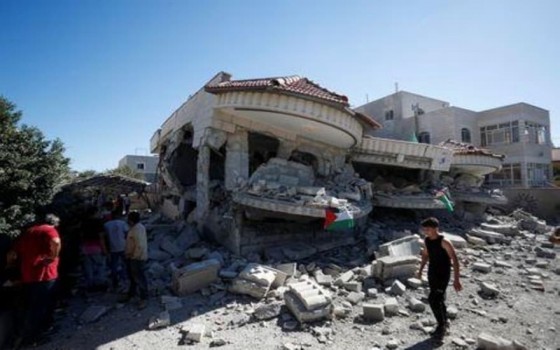
Lebanon commemorates the second anniversary of the port explosion, amid faltering investigations

- Europe and Arabs
- Thursday , 4 August 2022 13:41 PM GMT
Lebanon commemorates Thursday the second anniversary of the horrific explosion in the port of Beirut, while the suspension of the judicial investigation for months has angered the families of the victims who are organizing marches to the site of the disaster, demanding to know the truth. On August 4, 2020, the port of Beirut witnessed an unprecedented explosion that the Lebanese have not yet recovered from, as it killed more than two hundred people and injured more than 6,500 others, causing widespread damage to the port and a number of neighborhoods in the capital. The families of the victims, who are on an arduous journey to achieve justice, in a country where a culture of impunity has prevailed for decades, are organizing three marches starting at 3:00 p.m. (12:00 GMT) from three symbolic sites in Beirut to the port, where The grain stock in his barrens, cracked for weeks, is devastated by fire. The first march starts in front of the Palace of Justice, while the second starts from the headquarters of the fire brigade, embodying the last trip of nine members of the fire brigade who rushed to the port shortly before the explosion. The third starts from downtown Beirut, the heart of the popular demonstrations against the political class, accused of negligence, neglect and failure to manage the country's successive crises. The commemoration comes, days after the collapse of part of the northern silos, following weeks of continuous fire caused by officials and experts, due to the fermentation of grain stocks due to humidity and high temperature. Experts warn of the imminent collapse of additional parts in the coming hours. Tatiana Hasruti, who lost her father, a worker in silos in the explosion, describes the timing of the silos' collapse as "symbolic." "The silos are collapsing on us because we do not have any evidence about the truth of what happened, while they are doing their best to prevent investigations," she told AFP, referring to the political class whose interference in the investigation's work hinders the investigation. "But I hope the sight of the silos falling will give people the will to fight for justice and struggle with us" to achieve it, she adds. According to the authorities, the explosion was caused by storing large quantities of ammonium nitrate inside the port without preventive measures, following the outbreak of a fire whose causes were unknown. It later emerged that officials at several levels were aware of the dangers of storing the material and did nothing. - "nightmare" - The explosion, whose echoes reached the island of Cyprus, is considered one of the largest non-nuclear explosions in the world. It caused widespread destruction, similar to that caused by wars and natural disasters. The disaster exacerbated the unprecedented economic collapse that has continued since the fall of 2019, which has made the majority of Lebanese people below the poverty line. It has accelerated the pace of migration, especially among young people looking for new beginnings. Hasrouti says, "The ruling class kills us every day (..) If we do not die in the explosion, we will die of hunger and the lack of the most basic human rights." Two years after the explosion, Beirut has not recovered, with dilapidated infrastructure and public utilities unable to provide basic services, especially electricity and water. At night, the capital is plunged into complete darkness, while signs of destruction are visible in the port and neighboring neighborhoods. And since last month, the fires that erupted in the northern parts of Ahrarat have raised the fear of the Lebanese, especially the families of the victims and those living in the vicinity of the port. And renewed the shock left by the explosion. Lara Khachikian, 51, who watches the flames from her house facing the port, which was previously destroyed by the explosion, explains that the view is like a "nightmare." "I and my neighbors are always nervous. I get scared all the time and we can't sleep" at night, she told AFP. - 'We remember every moment' - When part of the northern silos collapsed on Sunday, the worst affected by the disaster, smoke and dust emitted from the port, reminiscent of a huge cloud left by the explosion two years ago that could be seen from several areas. "The smoke is unbearable and the smell has been coming from there for days," Lara explains. "You need an uncanny ability to live when you are reminded at every moment of the explosion." French expert Emmanuel Durand, who monitors silos curvature rates through sensors, warned Wednesday that the next collapse "could start at any time" and will include "at least four silos and up to ten in one go", which will generate dust and noise and raise panic. Widely.
AFP












No Comments Found